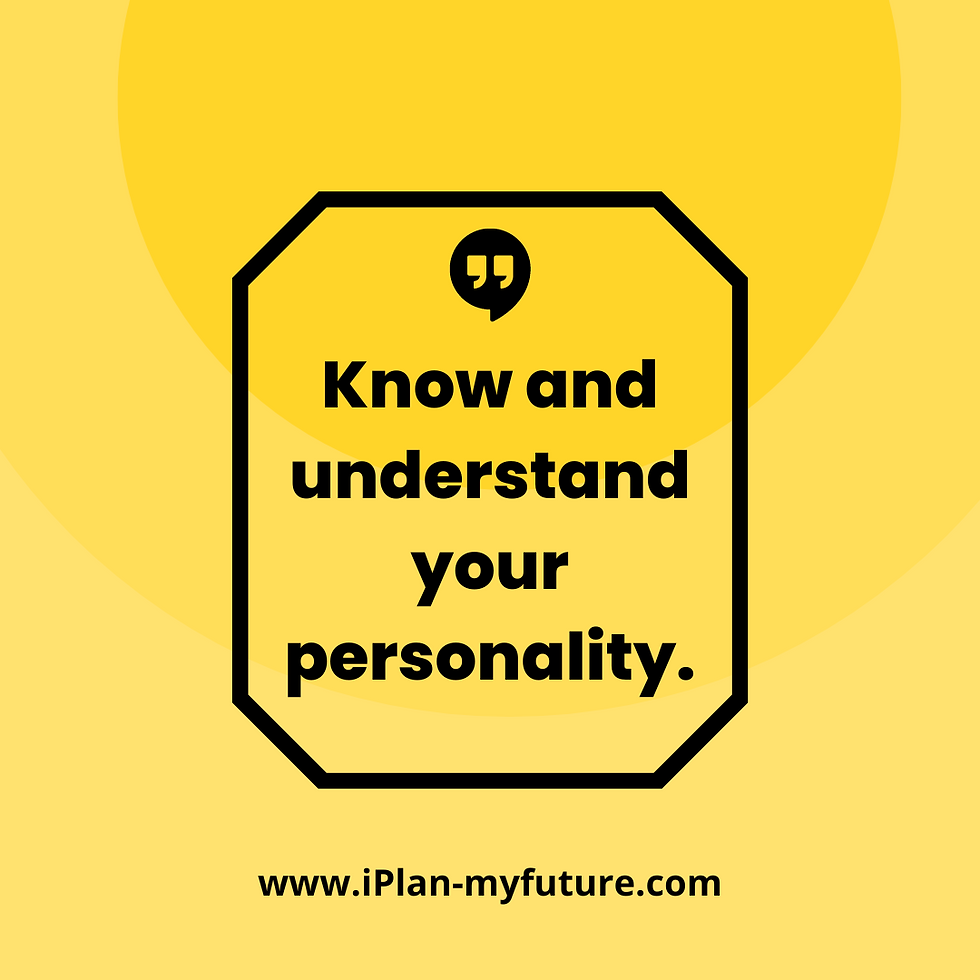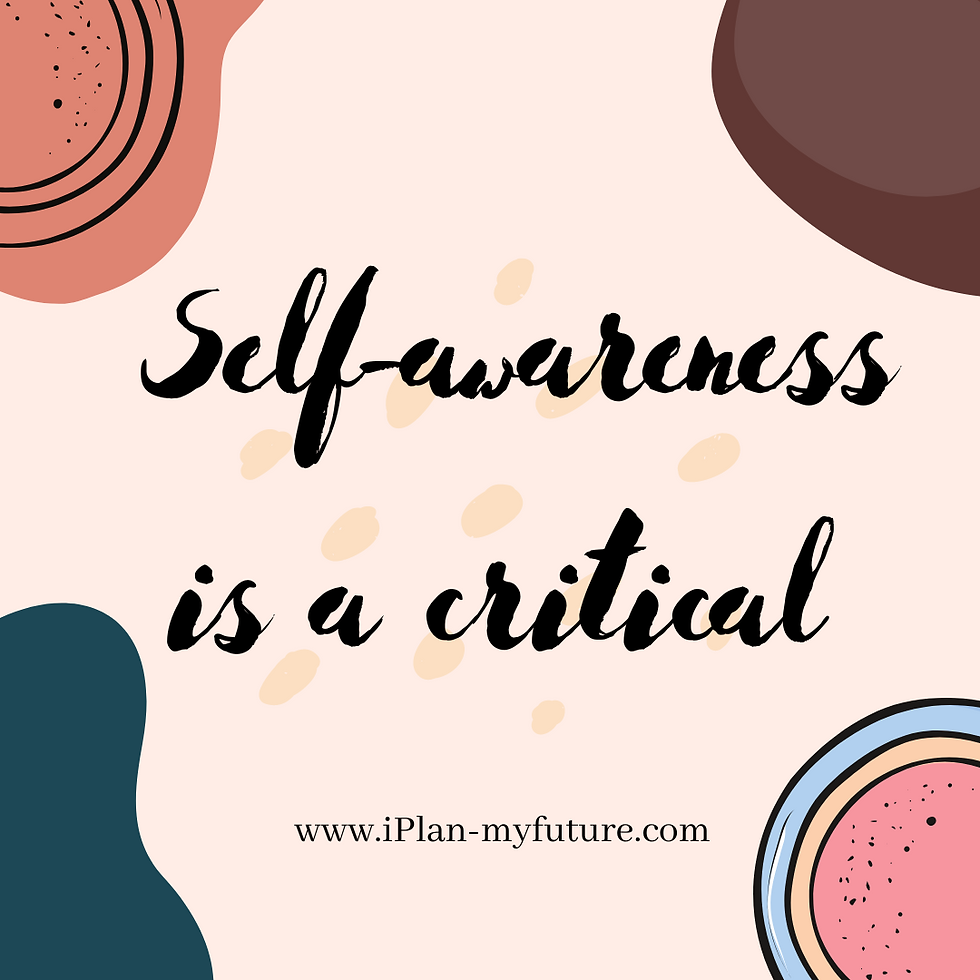Self-awareness
- iPlan-Myfuture

- Dec 30, 2024
- 9 min read

Introduction
Self-awareness is a fundamental aspect of human cognition that allows us to introspect and gain insight into our thoughts, feelings, and behaviours. By developing self-awareness, we can better understand ourselves, including our strengths, weaknesses, values, and beliefs. This heightened level of self-understanding empowers us to make more informed decisions in various aspects of our lives.
Moreover, self-awareness plays a crucial role in emotional intelligence (EQ), which is recognising, understanding, and managing our emotions and those of others. By being self-aware, we can better comprehend how our feelings influence our actions and interactions with people around us. This awareness enables us to regulate emotions effectively, improving relationships and communication skills.
A key benefit of self-awareness is recognising and addressing negative thought patterns or behaviours that may hinder our personal growth or professional success. Through self-reflection and introspection, we can identify areas for improvement and take proactive steps to make positive changes in our lives.
It is important to note that self-awareness is not a one-time achievement but an ongoing process that requires consistent practice and attention. By dedicating time to self-reflection and mindfulness, we can deepen our self-awareness and enhance our overall well-being.

Ability to know and understand your personality and emotions.
Self-awareness is a fundamental aspect of personal growth and emotional intelligence. It goes beyond mere self-knowledge by delving into the intricate understanding of one's thoughts, feelings, and behaviours in real-time situations. By being self-aware, individuals can gain insight into their strengths, weaknesses, and triggers, allowing them to navigate life more clearly and intentionally.
When people are self-aware, they are better equipped to make decisions that align with their values and goals, benefiting themselves and those around them. This heightened level of consciousness enables individuals to manage stress effectively and respond resiliently to challenges and setbacks. By recognising their emotional responses and triggers, self-aware individuals can regulate their reactions and maintain a sense of composure in stressful situations.
Moreover, self-awareness plays a crucial role in interpersonal relationships. It empowers individuals to communicate effectively, empathise with others, and resolve conflicts constructively. By understanding their own emotions and behaviours, individuals can navigate social interactions with greater empathy and authenticity, fostering healthier and more meaningful connections with others.

Why is self-awareness important?
Self-awareness is the initial step towards comprehending oneself, a skill that can also aid in understanding others. The more self-aware you become, the wiser decisions you will make. Self-awareness holds significance across various aspects of life, extending beyond just one's professional and personal relationships.
Through self-awareness, you can enhance your confidence and success in diverse areas, from collaborating with colleagues to parenting and dating. By gaining a deeper understanding of yourself, you can better regulate your emotions and maintain composure when faced with someone else's anger or frustration, whether a coworker or a loved one.
Enhanced self-understanding reduces negative behaviours: procrastination diminishes as we better grasp task durations; caring less about others' opinions results in increased happiness and productivity at work; ceasing to strive to please everyone allows us to prioritize ourselves and our families.

Advantages of self-awareness
Self-awareness is a fundamental aspect of personal growth and development. By being self-aware, individuals can gain a deeper insight into their thoughts, feelings, and behaviours. This introspection allows them to recognise patterns in their actions, understand the reasons behind their reactions, and identify areas for improvement.
Moreover, self-awareness is beneficial on an individual level and plays a crucial role in interpersonal relationships. Self-awareness better equips people to empathize with others, communicate effectively, and navigate conflicts constructively. This ability to understand oneself and others fosters healthier and more meaningful connections.
Self-awareness is particularly valuable for leaders as it directly impacts their ability to lead effectively. Leaders who possess self-awareness are more attuned to their strengths and weaknesses, enabling them to leverage their skills while seeking support in areas where they may be lacking. This awareness of their capabilities allows leaders to build high-performing teams, delegate tasks strategically, and inspire others through authentic leadership.
In essence, self-awareness serves as a cornerstone for personal and professional growth. It empowers individuals to take ownership of their actions, continuously learn and adapt, and cultivate a positive impact on those around them. By nurturing self-awareness, individuals can unlock their full potential and lead a more fulfilling and purposeful life.

Disadvantages of self-awareness
Feeling inadequate is a common experience that many individuals face at some point in their lives. It can stem from various sources, such as comparing oneself to others, societal pressures, or personal insecurities. The belief that one is not good enough often arises from setting high standards that are difficult to meet, leading to a perpetual cycle of self-doubt and criticism.
In addition to feeling inadequate, the pressure to constantly perform at a high level can also contribute to feelings of not doing enough. This pressure may come from internal sources, such as perfectionism or fear of failure, as well as external sources, such as societal expectations or workplace demands. When individuals set unrealistic expectations for themselves, they are more likely to feel like they are falling short, even when they put in significant effort.
Moreover, the fear of making mistakes or not doing things correctly can exacerbate feelings of inadequacy. Constantly questioning one's actions and seeking validation from others can create a sense of uncertainty and self-doubt. This tendency to second-guess oneself can harm self-esteem and overall well-being, reinforcing the belief that one is incapable.

Why are so many people not self-aware?
What is self-awareness?
Self-awareness is recognising and understanding one's thoughts, emotions, behaviours, and motivations. It involves being conscious of how one's actions impact oneself and others and having a clear perception of one's strengths, weaknesses, values, and beliefs.
Why are so many people not self-aware?
There are various reasons why many individuals lack self-awareness. One common factor is avoiding self-reflection or introspection due to fear of uncovering uncomfortable truths about oneself. Additionally, societal influences, such as societal norms and expectations, can hinder self-awareness by shaping individuals' perceptions of themselves based on external factors rather than internal reflection. Moreover, distractions in the modern world, such as technology and busy lifestyles, often prevent people from engaging in deep self-exploration.
Despite its importance for personal growth and development, self-awareness is a skill that requires continuous effort and practice. Developing self-awareness involves cultivating mindfulness, seeking feedback from others, journaling, and engaging in self-assessment exercises. Enhancing self-awareness allows individuals to make better decisions, improve their relationships, and lead more fulfilling lives.

Being aware of your weaknesses
Understanding and acknowledging your weaknesses is crucial to personal growth and development. By recognizing where you may fall short or struggle, you open up opportunities for improvement and self-improvement. This self-awareness allows you to take proactive steps towards addressing and working on these weaknesses to become a better version of yourself.
Identifying your weaknesses is the initial phase in the journey towards self-improvement. It provides a clear starting point for building a plan to enhance your skills and abilities. This awareness empowers you to set realistic goals and benchmarks for progress, ultimately leading to a more fulfilling and successful life.
Moreover, understanding your weaknesses can also illuminate your strengths. Contrasting your weaknesses with your strengths gives you a comprehensive view of your capabilities and limitations. This balanced perspective enables you to leverage your strengths to compensate for shortcomings, fostering a well-rounded and resilient personality.

Being aware of your strengths
Leading yourself effectively is a journey that begins with cultivating self-awareness. This process involves delving deep into your identity and understanding your values, beliefs, and capabilities. By gaining a clear insight into who you are, you lay a solid foundation for stepping into a leadership role with confidence and purpose.
Moreover, once you deeply understand yourself, you must leverage your strengths to drive success. Individuals with a talent for visualising concepts and identifying patterns in data can make significant impacts as leaders. These skills can help their team members grasp complex ideas more efficiently and uncover valuable insights that might otherwise remain hidden.
In addition to recognising and harnessing your strengths, it is equally crucial to acknowledge and appreciate the strengths of others. In collaborative settings where diverse talents and skills converge, understanding the unique capabilities of your team members is critical. You can optimise team performance by delegating tasks accordingly and recognising where others excel, such as having exceptional communication skills or technical expertise. This plays to each individual's strengths and fosters a more efficient and harmonious work environment.

Being aware of being stuck
Being stuck is not bad; it can be the perfect place to start a new journey of self-discovery and personal development. When we feel stuck in a certain situation or mindset, we have an opportunity to pause, reflect, and reassess our goals and priorities.
Embracing this feeling of being stuck can lead to valuable insights and lessons to help us learn, grow, and ultimately change for the better. During these moments of stagnation, we have the chance to explore new possibilities, challenge our comfort zones, and push ourselves to overcome obstacles.
Rather than viewing being stuck as a negative experience, we can choose to see it as a stepping stone towards progress and transformation. By approaching this state with an open mind and a willingness to evolve, we can harness its potential to propel us towards a more fulfilling and purposeful life.

How can you develop more self-awareness?
To increase your self-awareness, it's crucial to delve deep into your thoughts and emotions regarding yourself. Seeking feedback from others is a valuable step in this process, as it provides an external perspective that can offer insights you may not have considered. Observing your behaviour and its impact on those around you is another essential aspect of self-discovery. Evaluating your actions and reactions honestly can reveal patterns and tendencies that shape your self-perception.
Engaging in introspection is critical to understanding your inner world. By asking probing questions such as "What am I feeling?" and "Why am I feeling this way?" you can uncover underlying motivations and triggers that influence your behaviour. This self-inquiry practice fosters a deeper connection with your emotions and thoughts, paving the way for heightened self-awareness.
In addition to these reflective practices, soliciting feedback from others on their perceptions of you can offer valuable insights into how your behaviour is perceived. This feedback loop enhances your self-awareness and cultivates empathy and understanding of others. By actively seeking feedback and engaging in self-reflection, you can better understand your identity and how you interact with the world around you.
Another effective method for enhancing self-awareness is to self-assess your strengths and weaknesses. By compiling a list of attributes you excel in and areas where you have room for growth, you can better understand your capabilities and areas for improvement. Utilizing tools like the ABC method, which breaks down Adversity, Beliefs, and Consequences, can provide a structured approach to analyzing your thought patterns and behaviours.

Self-awareness expands our awareness of other people.
Self-awareness is not just about understanding ourselves; it also plays a crucial role in fostering meaningful connections with others. By being aware of our thoughts, emotions, and behaviours, we can develop a more profound sense of empathy towards those around us. This ability to put ourselves in someone else's shoes allows us to comprehend their experiences and emotions more profoundly.
Moreover, self-awareness serves as a mirror that reflects our true selves. By examining our actions and reactions objectively, we gain insights into our strengths, weaknesses, and areas for growth. This introspection enhances our understanding of others and contributes to our personal development and self-improvement.
When we practice self-awareness, we open doors to new perspectives and possibilities. By viewing ourselves from an external standpoint, we can gain a fresh outlook on our lives and relationships. This broader view enables us to appreciate the diversity of human experiences and fosters a sense of interconnectedness with the world around us.

Self-awareness creates opportunities for growth in all areas of your life.
Self-awareness is the cornerstone of emotional intelligence, mindfulness, and personal growth. The profound understanding of one's thoughts, emotions, and behaviours empowers individuals to navigate life's challenges with clarity and purpose. By delving into the depths of our psyche, we uncover hidden truths and insights that pave the way for transformative change.
Embracing self-awareness is not merely a luxury but a fundamental necessity for cultivating happiness and overall well-being. Without a keen awareness of our inner workings, we risk being adrift in a sea of uncertainty, unable to steer our lives towards fulfilment and contentment.
Developing self-awareness requires a willingness to embark on a journey of self-discovery. This often involves confronting uncomfortable truths and shedding light on aspects of ourselves that have long remained in the shadows. It demands introspection and a commitment to unravelling the complexities of our own identity.
Furthermore, self-awareness is the key to fostering meaningful and authentic relationships with others. By understanding our desires, fears, and motivations, we are better equipped to connect with others deeply, cultivating empathy, compassion, and mutual understanding.
In a world that often prioritises external validation over internal reflection, embracing self-awareness is a radical act of self-love and empowerment. It is a journey towards self-acceptance, personal growth, and profound transformation that has the power to reshape not only our own lives but also the world around us.
Conclusion
Self-awareness is a fundamental trait of immense value in personal and professional development. By honing this skill, individuals embark on a journey of introspection and self-discovery, gaining profound insights into their character, behaviours, and motivations. Understanding one's strengths and weaknesses is a cornerstone for self-improvement, allowing individuals to capitalize on their positive attributes while actively working on areas that require enhancement.
Enhanced self-awareness benefits the individual and has a ripple effect on interpersonal relationships and teamwork dynamics. When individuals possess a deep understanding of themselves, they are better equipped to communicate effectively with others, fostering understanding, empathy, and collaboration. In a team setting, heightened self-awareness enables members to leverage each other's strengths, complement weaknesses, and work harmoniously towards shared goals.
Moreover, self-awareness acts as a catalyst for personal growth and development. By being attuned to their thoughts, emotions, and actions, individuals can identify areas for improvement and seize growth opportunities that may have otherwise gone unnoticed. This proactive approach to self-improvement fuels continuous learning and empowers individuals to navigate challenges, setbacks, and uncertainties with resilience and adaptability.
In essence, cultivating self-awareness is a transformative journey that empowers individuals to unlock their full potential, nurture meaningful relationships, and navigate life's complexities with clarity and purpose. It is a skill that, when nurtured and developed, serves as a guiding light towards self-fulfilment, success, and holistic well-being.
For more information on our eBooks, visit here.

Connect with us:
Twitter: iPlan_MyFuture
Instagram: https://www.instagram.com/iplan_myfuture/
TikTok: @iplan_myfuture
Facebook: Visit Profile













Comments